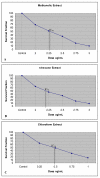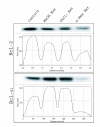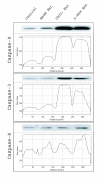Induction of apoptosis in HeLa cells by chloroform fraction of seed extracts of Nigella sativa
- PMID: 19943925
- PMCID: PMC2794855
- DOI: 10.1186/1475-2867-9-29
Induction of apoptosis in HeLa cells by chloroform fraction of seed extracts of Nigella sativa
Abstract
Background: Cancer remains one of the most dreaded diseases causing an astonishingly high death rate, second only to cardiac arrest. The fact that conventional and newly emerging treatment procedures like chemotherapy, catalytic therapy, photodynamic therapy and radiotherapy have not succeeded in reverting the outcome of the disease to any drastic extent, has made researchers investigate alternative treatment options. The extensive repertoire of traditional medicinal knowledge systems from various parts of the world are being re-investigated for their healing properties. This study progresses in the direction of identifying component(s) from Nigella sativa with anti cancer activity. In the present study we investigated the efficacy of Organic extracts of Nigella sativa seed powder for its clonogenic inhibition and induction of apoptosis in HeLa cancer cell.
Results: Methanolic, n-Hexane and chloroform extracts of Nigella sativa seedz effectively killed HeLa cells. The IC50 values of methanolic, n-hexane, and chloroform extracts of Nigella sativa were 2.28 microg/ml, 2.20 microg/ml and 0.41 ng/ml, respectively. All three extracts induced apoptosis in HeLa cells. Apoptosis was confirmed by DNA fragmentation, western blot and terminal transferase-mediated dUTP-digoxigenin-end labeling (TUNEL) assay.
Conclusion: Western Blot and TUNEL results suggested that Nigella sativa seed extracts regulated the expression of pro- and anti- apoptotic genes, indicating its possible development as a potential therapeutic agent for cervical cancer upon further investigation.
Figures







Similar articles
-
Methanolic extract of Nigella sativa seed inhibits SiHa human cervical cancer cell proliferation through apoptosis.Nat Prod Commun. 2013 Feb;8(2):213-6. Nat Prod Commun. 2013. PMID: 23513732
-
Whole and Purified Aqueous Extracts of Nigella sativa L. Seeds Attenuate Apoptosis and the Overproduction of Reactive Oxygen Species Triggered by p53 Over-Expression in the Yeast Saccharomyces cerevisiae.Cells. 2022 Mar 3;11(5):869. doi: 10.3390/cells11050869. Cells. 2022. PMID: 35269491 Free PMC article.
-
Evaluation of antimicrobial and anti-inflammatory activities of seed extracts from six Nigella species.J Med Food. 2009 Apr;12(2):408-15. doi: 10.1089/jmf.2007.0600. J Med Food. 2009. PMID: 19459745
-
Phytochemistry, pharmacology, and therapeutic uses of black seed (Nigella sativa).Chin J Nat Med. 2016 Oct;14(10):732-745. doi: 10.1016/S1875-5364(16)30088-7. Epub 2016 Oct 31. Chin J Nat Med. 2016. PMID: 28236403 Review.
-
Nigella sativa (black seed) safety: an overview.Asian Biomed (Res Rev News). 2020 Sep 20;14(4):127-137. doi: 10.1515/abm-2020-0020. eCollection 2020 Aug. Asian Biomed (Res Rev News). 2020. PMID: 37551386 Free PMC article. Review.
Cited by
-
Increased Oxidative Stress Induced by Rubus Bioactive Compounds Induce Apoptotic Cell Death in Human Breast Cancer Cells.Oxid Med Cell Longev. 2019 Jun 3;2019:6797921. doi: 10.1155/2019/6797921. eCollection 2019. Oxid Med Cell Longev. 2019. PMID: 31281587 Free PMC article.
-
Black cumin (Nigella sativa) and its constituent (thymoquinone): a review on antimicrobial effects.Iran J Basic Med Sci. 2014 Dec;17(12):929-38. Iran J Basic Med Sci. 2014. PMID: 25859296 Free PMC article. Review.
-
Pleiocarpa pycnantha leaves and its triterpenes induce apoptotic cell death in Caco-2 cells in vitro.BMC Complement Altern Med. 2015 Jul 14;15:224. doi: 10.1186/s12906-015-0767-4. BMC Complement Altern Med. 2015. PMID: 26169589 Free PMC article.
-
Artemisia absinthium (AA): a novel potential complementary and alternative medicine for breast cancer.Mol Biol Rep. 2012 Jul;39(7):7373-9. doi: 10.1007/s11033-012-1569-0. Epub 2012 Feb 5. Mol Biol Rep. 2012. PMID: 22311047
-
Antiproliferative effects of n-butyl-β-D-fructofuranoside from Kangaisan on Bel-7402 cells.Indian J Pharmacol. 2014 Jan-Feb;46(1):69-75. doi: 10.4103/0253-7613.125175. Indian J Pharmacol. 2014. PMID: 24550588 Free PMC article.
References
-
- Cancer statistics-American Cancer society data. 2008. http://www.cancer.org/docroot/STT/stt_0_2008.asp?sitearea=STT&level=1
-
- Spiridon EK, Maria GB. Plants that Fights Cancer. CRC Press LLC; 2004.
-
- World Health Organization. "Fact sheet No. 297: Cancer". Retrieved on (2007); 01-12.
-
- "GLOBOCAN (2002) database: summary table by cancer". Retrieved on 2008-10-26.
LinkOut - more resources
Full Text Sources

